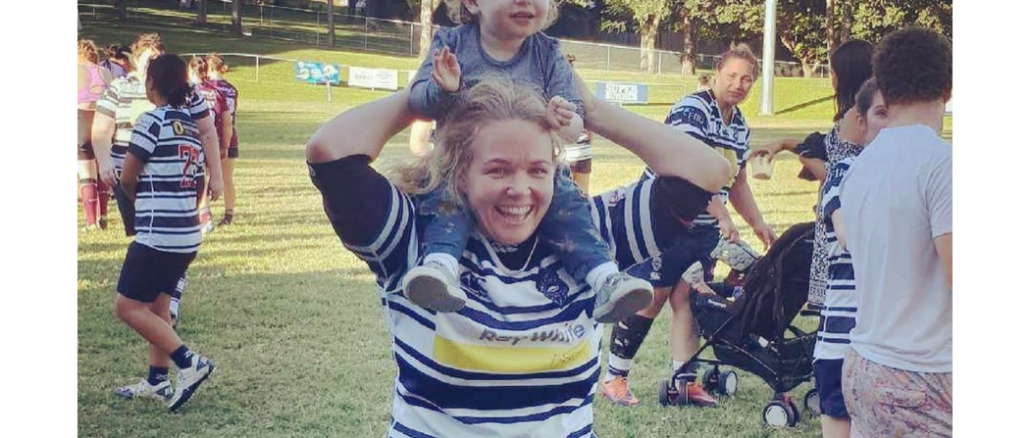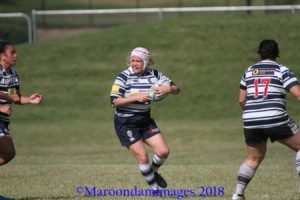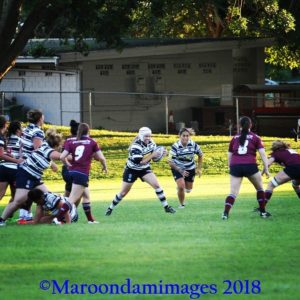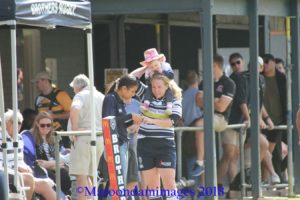
100 Games to Show Girls It’s Possible
At the beginning of the year Jennifer Gillett received a message from the manager of Brothers Rugby Club in Brisbane. He’d sent the message to Jennifer and a few other women who had also started playing with the club back in 1996. The message, Jennifer tells me, went something like this: Hey girls, we just finished the stats…guess who’s the highest playing woman?
Jennifer hadn’t played for the club in at least eight years. Her focus had shifted – to her career, her photography and her two-year old daughter. She was taken aback to discover that she was in fact the highest playing woman. Not only had she played the most games, but she only had ten more to go to reach one hundred.

The temptation to return for one season to reach the goal of one hundred games was too great. Of course, she thought to herself, it’s only ten games!
She knew she could do it, especially with the club wholeheartedly supporting her return. It would be more than just a personal legacy, though. She knew it would also ensure that women’s rugby would be at Brothers forever. Quite simply she wanted to return to ‘get the 100 to show girls it’s possible.’
It wasn’t exactly a surprise that the club respected and wanted to recognise her achievement, but their support still overwhelmed her.
The culture within rugby clubs around the nation hasn’t always been this welcoming to women. A lot has changed since she first started playing over three decades ago.
Jennifer’s first awareness of rugby arrived at high school. She’d sit on the sidelines and watch her brother play. It wasn’t until she went to university to study human movement and business that she discovered rugby for women. She’d been so captivated by watching her brother play she thought she’d give it a go herself. ‘Netball and basketball weren’t really cutting it,’ she says. ‘Rugby’s quite a technical, strategic game – I was really interested in getting to know the game.’ It was at one of these university games that she heard a call out for club rugby.

This was in 1996, when rugby was still largely considered a men’s sport, and when the clubs themselves were true boys’ clubs. ‘It wasn’t really accepted for women to be playing,’ Jennifer tells me, ‘but we had really strong advocates at the club who just made it happen, who just kept badgering the old boys to have us included.’
Even once the women became more involved in the club, the stigma persisted. Jennifer tells me they would regularly be ridiculed, or stereotyped as lesbians. Though the angst around this stigma, she notes, only took up about a quarter of her time. ‘The other three quarters were playing with mates, socialising with mates, and having a ball. And those mates are now my oldest and dearest mates.’
A turning point for women’s rugby was the 2016 Olympic Games when Australia won the first Olympic gold medal in women’s rugby. It was an historic moment not just for the nation but for women in sport more generally. Jennifer says it’s been a lot easier since this international exposure and the respect it earned.
When Jennifer returned to play her last season, she knew she’d have to learn all her fellow teammate’s names. During drills and warm-ups she tried to listen out as they called to each other, but more often than not she heard ‘Mum, Mum, pass the ball!’ Jennifer jokes that this made it all the more difficult for her to learn names, but in reality it thrilled her that mothers and daughters were playing now. It was testament to the changing times. ‘That happened only in the last decade in regards to grassroots rugby, little tykes playing, and the young girls are now doing that because they want to. The average age in my team would be 18 because they’ve all been exposed to the game from a very young age. If you want to play, you play. It’s a big change from when I started.’

There was one last potential hurdle to completing her 100th game, she tells me. ‘I didn’t think my body would make it through the season to get to this game.’
Now over forty, age has made it all slightly harder this time round. She’s had sore muscles this season, she says, purely because of her age. ‘It’s just a whole different ball game when you’re over forty. So getting up in the morning to get my daughter out of the cot after a game has been interesting, shuffling into the room.’
I spoke to Jennifer a day before the big game, which she played on Saturday 7th July. ‘I’m very nervous,’ she said, ‘I’m always nervous about playing games.’
Brothers Rugby Club is eager to recognise Jennifer’s achievement. For playing 100 games they issued her an honours cap, only fifty of which have been given to players since World War 2.
‘It’s been astounding that an average player like me who just loves the game has been recognised and I want that to be the example to my current team mates and anyone in the future. You don’t have to be a superstar, this is all about club loyalty and what club sports can give you. I’ve got the best of mates and I’ve travelled the world meeting up with old player-friends.’
She credits the club with supporting her to be the best player she could. ‘The coaches have been amazing, they really support the player and I want the girls coming up to know that loyalty to a club is worth it.’
She thinks this will be her last season. ‘After this I will be a lot more focussed on my creative avenues.’
In the years that she wasn’t playing rugby, she was busy working her way up the ladder and breaking through the glass ceiling in another industry – construction – which she says is also a boys’ club. There were, in fact, ‘a few parallels between my career and my sport.’
But retiring from rugby doesn’t mean slowing down for Jennifer. In the past she’s climbed Everest base camp, hiked through the jungles of Borneo, and had a gallery exhibition for her photography, so there’s no doubt she’ll continue to push and test herself in other arenas.

SheSociety is a site for the women of Australia to share our stories, our experiences, shared learnings and opportunities to connect.

Leave a Reply